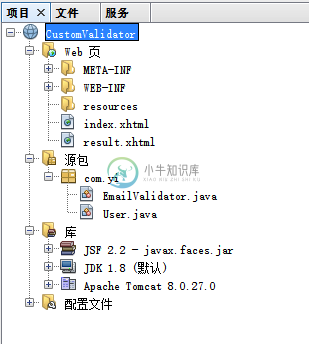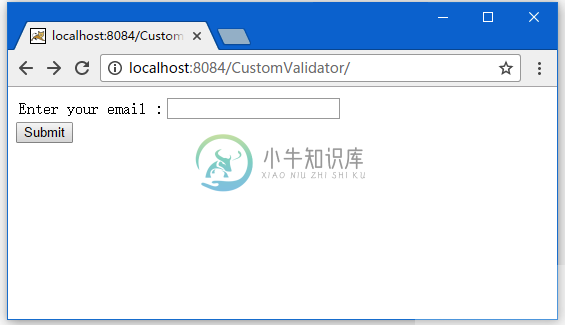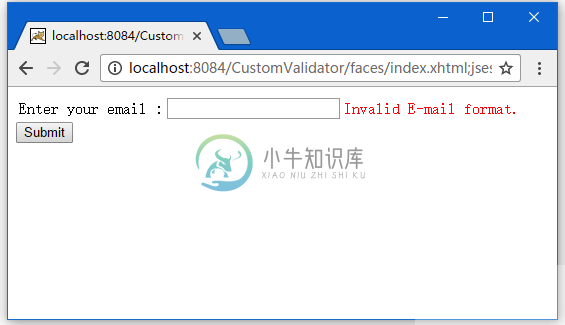JSF自定义验证器类
精华
小牛编辑
178浏览
2023-03-14
我们可以在JSF中创建自己的自定义验证器。以下列表是在JSF中创建自定义验证器的步骤。
- 通过实现
javax.faces.validator.Validator接口创建一个验证器类。 - 实现上面接口的
validate()方法。 - 使用注释
@FacesValidator为自定义验证器分配唯一的ID。
自定义验证器类实例
打开 NetBeans IDE 创建一个Web工程:CustomValidator,其目录结构如下所示 -

创建以下文件代码,文件:index.xhtml 的代码内容如下所示 -
<?xml version="1.0" encoding="UTF-8"?>
<!DOCTYPE html PUBLIC "-//W3C//DTD XHTML 1.0 Transitional//EN"
"http://www.w3.org/TR/xhtml1/DTD/xhtml1-transitional.dtd">
<html xmlns="http://www.w3.org/1999/xhtml"
xmlns:h="http://java.sun.com/jsf/html"
xmlns:f="http://java.sun.com/jsf/core">
<h:body>
<h:form>
<h:panelGrid columns="3">
Enter your email :
<h:inputText id="email" value="#{user.email}"
size="20" required="true" label="Email Address">
<f:validator validatorId="com.yiibai.EmailValidator" />
</h:inputText>
<h:message for="email" style="color:red" />
</h:panelGrid>
<h:commandButton value="Submit" action="result" />
</h:form>
</h:body>
</html>
文件:result.xhtml 的代码内容如下所示 -
<?xml version="1.0" encoding="UTF-8"?>
<!DOCTYPE html PUBLIC "-//W3C//DTD XHTML 1.0 Transitional//EN"
"http://www.w3.org/TR/xhtml1/DTD/xhtml1-transitional.dtd">
<html xmlns="http://www.w3.org/1999/xhtml"
xmlns:h="http://java.sun.com/jsf/html"
>
<h:body>
<h1>Custom validator in JSF 2.0</h1>
<h:panelGrid columns="2">
Email Address :
<h:outputText value="#{user.email}" />
</h:panelGrid>
</h:body>
</html>
文件:EmailValidator.java 的代码内容如下所示 -
/*
* To change this license header, choose License Headers in Project Properties.
* To change this template file, choose Tools | Templates
* and open the template in the editor.
*/
package com.yiibai;
/**
*
* @author Administrator
*/
import java.util.regex.Matcher;
import java.util.regex.Pattern;
import javax.faces.application.FacesMessage;
import javax.faces.component.UIComponent;
import javax.faces.context.FacesContext;
import javax.faces.validator.FacesValidator;
import javax.faces.validator.Validator;
import javax.faces.validator.ValidatorException;
@FacesValidator("com.yiibai.EmailValidator")
public class EmailValidator implements Validator {
private static final String EMAIL_PATTERN = "^[_A-Za-z0-9-]+(\\."
+ "[_A-Za-z0-9-]+)*@[A-Za-z0-9]+(\\.[A-Za-z0-9]+)*"
+ "(\\.[A-Za-z]{2,})$";
private Pattern pattern;
private Matcher matcher;
public EmailValidator() {
pattern = Pattern.compile(EMAIL_PATTERN);
}
@Override
public void validate(FacesContext context, UIComponent component,
Object value) throws ValidatorException {
matcher = pattern.matcher(value.toString());
if (!matcher.matches()) {
FacesMessage msg
= new FacesMessage("E-mail validation failed.",
"Invalid E-mail format.");
msg.setSeverity(FacesMessage.SEVERITY_ERROR);
throw new ValidatorException(msg);
}
}
}
文件:User.java 的代码内容如下所示 -
/*
* To change this license header, choose License Headers in Project Properties.
* To change this template file, choose Tools | Templates
* and open the template in the editor.
*/
package com.yiibai;
/**
*
* @author Maxsu
*/
import java.io.Serializable;
import javax.faces.bean.ManagedBean;
import javax.faces.bean.SessionScoped;
@ManagedBean(name = "user")
@SessionScoped
public class User implements Serializable {
private static final long serialVersionUID = 1L;
String email;
public String getEmail() {
return email;
}
public void setEmail(String email) {
this.email = email;
}
}
右键运行工程:CustomValidator,如果没有任何错误,打开浏览器访问:
http://localhost:8084/CustomValidator/
应该会看到以下结果 -

简单写入一些信息(输入一个无效的Email地址),然后提交 -

